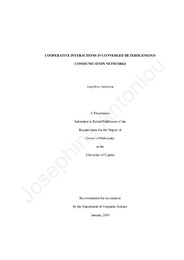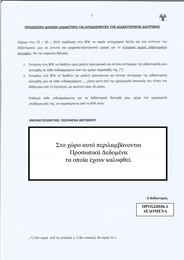| dc.contributor.advisor | Pitsillides, Andreas | en |
| dc.contributor.author | Antoniou, Josephina | en |
| dc.coverage.spatial | Κύπρος | el |
| dc.coverage.spatial | Cyprus | en |
| dc.creator | Antoniou, Josephina | en |
| dc.date.accessioned | 2012-09-21T07:35:39Z | |
| dc.date.accessioned | 2017-08-03T10:45:24Z | |
| dc.date.available | 2012-09-21T07:35:39Z | |
| dc.date.available | 2017-08-03T10:45:24Z | |
| dc.date.issued | 2010-05 | |
| dc.date.submitted | 2010-05-25 | |
| dc.identifier.uri | https://gnosis.library.ucy.ac.cy/handle/7/39556 | en |
| dc.description | Includes bibliography (p. 138-144). | en |
| dc.description | Number of sources in the bibliography: 105 | en |
| dc.description | Thesis (Ph. D.) -- University of Cyprus, Faculty of Pure and Applied Sciences, Department of Computer Science, June 2010. | en |
| dc.description | The University of Cyprus Library holds the printed form of the thesis. | en |
| dc.description.abstract | Τα δίκτυα πρόσβασης που συμμετέχουν στα Δίκτυα Επικοινωνίας Επόμενης Γενιάς έχουν διαφορετικά χαρακτηριστικά και ικανότητες, ενθαρρύνοντας τη διαφοροποίηση του χειρισμού της μεταφοράς από τον χειρισμού του περιεχομένου μιας επικοινωνίας. Έτσι έχουμε ανεξάρτητες οντότητες που χειρίζονται την υποδομή του δικτύου, την παροχή περιεχομένου και υπηρεσιών. Αυτή η ετερογένεια συνδέεται από μια κοινή κλωστή, η οποία είναι ο κοινός στόχος ικανοποίησης των πελατών του ετερογενούς δικτύου. Τα Δίκτυα Επικοινωνίας Επόμενης Γενιάς στοχεύουν να εκμεταλλευτούν αυτά τα διαφορετικά χαρακτηριστικά με συμπληρωματικούς τρόπους για να επιτύχουν την αντιμετώπιση οποιονδήποτε μειονεκτημάτων μπορεί να έχει καθένα από τα συμμετέχοντα δίκτυα πρόσβασης από μόνο του, μέσω συνεργασιών. Οι συνεργασίες μεταξύ των συμμετεχόντων οντοτήτων προωθούν την χρήσιμη συνύπαρξη τους, βελτιώνοντας ολόκληρο το δίκτυο, αφού χωρίς τέτοιες συνεργασίες, η υποστήριξη απαιτητικών υπηρεσιών, όπως υπηρεσιών πολυμέσων πολλών συμμετεχόντων κλπ, είναι δύσκολη λόγω της ετερογένειας που υπάρχει στα δίκτυα αυτά και ιδιαίτερα των ίδιων των οντοτήτων, π.χ. των χρηστών και των δικτύων πρόσβασης. Αυτή η ετερογένεια έχει ως αποτέλεσμα τα διαφορετικά και συχνά συγκρουόμενα συμφέροντα αυτών των οντοτήτων. Εφόσον η συνεργασία μεταξύ τους, εάν επιτευχθεί, αναμένεται να είναι επικερδής, θέτουμε το εξής ερώτημα: Μπορεί να παρακινηθεί η συνεργασία σε καταστάσεις αλληλεπίδρασης που προκύπτουν σε Δίκτυα Επικοινωνιών Επόμενης Γενιάς, και εάν ναι, είναι επικερδής για τις οντότητες που συμμετέχουν; Με σκοπό την απάντηση αυτού του ερωτήματος αυτή η διατριβή απομονώνει και μελετά τρεις διαφορετικές καταστάσεις αλληλεπίδρασης μεταξύ δικτύων και χρηστών και προτείνει κατάλληλους τρόπους συμπεριφοράς ούτως ώστε οι οντότητες να είναι ικανοποιημένες από την συνεργασία. | el |
| dc.description.abstract | Access Networks participating in Next Generation Communication Networks carry differing characteristics and capabilities encouraging the decoupling of carriage and content, i.e. the infrastructure operators and the service or content providers can be different entities in this new system. Furthermore, the common thread that links all this heterogeneity of Next Generation Communication Networks is the support for a user-centric paradigm of communication, i.e. to satisfy its customers. Next Generation Communication Networks plan to take advantage of these varying characteristics, exploiting them in complementary manners in order to achieve to surpass any limits imposed by any one of these networks on its own, through appropriate network synergies. Synergies, i.e. cooperation between participating entities in Next Generation Communication Networks, promote the useful co-existence of heterogeneous entities, aiming at enhancing the overall network, since the support of demanding multimedia services, such as interactive and multiparty multimedia services, becomes a challenging task due to the heterogeneity of the entities involved, the user(s) and the access network(s). This heterogeneity results in different and often conflicting interests for these entities. Since cooperation between these entities, if achieved, is expected to be beneficial, we pose the following question: Can cooperation be motivated in interactive situations arising in Next Generation Communication Networks, and if yes, is it beneficial for the interacting entities? In pursue of answering this question, this thesis isolates and studies three different interactive situations between user(s) and network(s) and proposes appropriate modes of behaviour that allow the interacting entities to achieve own satisfaction. | en |
| dc.format.extent | xi, 144 p. : ill. ; 30 cm. | en |
| dc.language.iso | eng | en |
| dc.publisher | Πανεπιστήμιο Κύπρου, Σχολή Θετικών και Εφαρμοσμένων Επιστημών / University of Cyprus, Faculty of Pure and Applied Sciences | |
| dc.rights | info:eu-repo/semantics/openAccess | en |
| dc.rights | Open Access | en |
| dc.subject.lcsh | Computer networks | en |
| dc.subject.lcsh | Game theory | en |
| dc.subject.lcsh | Heterogeneous computing | en |
| dc.subject.lcsh | High performance computing | en |
| dc.subject.lcsh | Negotiation | en |
| dc.subject.lcsh | Prisoner s dilemma game | en |
| dc.title | Cooperative interactions in converged heterogeneous communication networks | en |
| dc.title.alternative | Αλληλεπιδράσεις Συνεργασίας σε Ετερογενή, Συγκλίνοντα Δίκτυα Επικοινωνιών | el |
| dc.type | info:eu-repo/semantics/doctoralThesis | en |
| dc.contributor.committeemember | Πιτσιλλίδης, Ανδρέας | el |
| dc.contributor.committeemember | Χριστοδούλου, Χρίστος | el |
| dc.contributor.committeemember | Βασιλείου, Βάσος | el |
| dc.contributor.committeemember | Κουρκουμπέτης, Κωνσταντίνος | el |
| dc.contributor.committeemember | Aghvami, Hamid | en |
| dc.contributor.committeemember | Pitsillides, Andreas | en |
| dc.contributor.committeemember | Christodoulou, Chris | en |
| dc.contributor.committeemember | Vasilliou, Vasos | en |
| dc.contributor.committeemember | Courcoubetis, Constantinos | en |
| dc.contributor.department | Πανεπιστήμιο Κύπρου, Σχολή Θετικών και Εφαρμοσμένων Επιστημών, Τμήμα Πληροφορικής | el |
| dc.contributor.department | University of Cyprus, Faculty of Pure and Applied Sciences, Department of Computer Science | en |
| dc.subject.uncontrolledterm | ΘΕΩΡΙΑ ΠΑΙΓΝΙΩΝ | el |
| dc.subject.uncontrolledterm | ΔΙΚΤΥΑ ΕΠΙΚΟΙΝΩΝΙΩΝ ΕΠΟΜΕΝΗΣ ΓΕΝΙΑΣ | el |
| dc.subject.uncontrolledterm | ΑΛΛΗΛΕΠΙΔΡΑΣΕΙΣ ΣΥΝΕΡΓΑΣΙΑΣ | el |
| dc.subject.uncontrolledterm | ΤΟ ΔΙΛΗΜΜΑ ΤΟΥ ΦΥΛΑΚΙΣΜΕΝΟΥ | el |
| dc.subject.uncontrolledterm | ΜΟΝΤΕΛΑ ΔΙΑΠΡΑΓΜΑΤΕΥΣΗΣ | el |
| dc.subject.uncontrolledterm | ΜΟΝΤΕΛΑ ΣΥΝΑΣΠΙΣΜΩΝ | el |
| dc.subject.uncontrolledterm | ΑΛΛΗΛΕΠΙΔΡΑΣΕΙΣ ΧΡΗΣΤΗ-ΔΙΚΤΥΟΥ | el |
| dc.subject.uncontrolledterm | ΑΛΛΗΛΕΠΙΔΡΑΣΕΙΣ ΕΤΕΡΟΓΕΝΩΝ ΔΙΚΤΥΩΝ | el |
| dc.subject.uncontrolledterm | NEXT GENERATION COMMUNICATION NETWORKS | en |
| dc.subject.uncontrolledterm | COOPERATIVE INTERACTIONS | en |
| dc.subject.uncontrolledterm | PRISONER’S DILEMMA | en |
| dc.subject.uncontrolledterm | BARGAINING MODELS | en |
| dc.subject.uncontrolledterm | COALITION MODELS | en |
| dc.subject.uncontrolledterm | USER-NETWORK INTERACTION | en |
| dc.subject.uncontrolledterm | HETEROGENEOUS NETWORKS΄ INTERACTION | en |
| dc.identifier.lc | QA76.88.A68 2010 | en |
| dc.author.faculty | Σχολή Θετικών και Εφαρμοσμένων Επιστημών / Faculty of Pure and Applied Sciences | |
| dc.author.department | Τμήμα Πληροφορικής / Department of Computer Science | |
| dc.type.uhtype | Doctoral Thesis | en |
| dc.rights.embargodate | 2010-05-25 | |
| dc.contributor.orcid | Pitsillides, Andreas [0000-0001-5072-2851] | |


